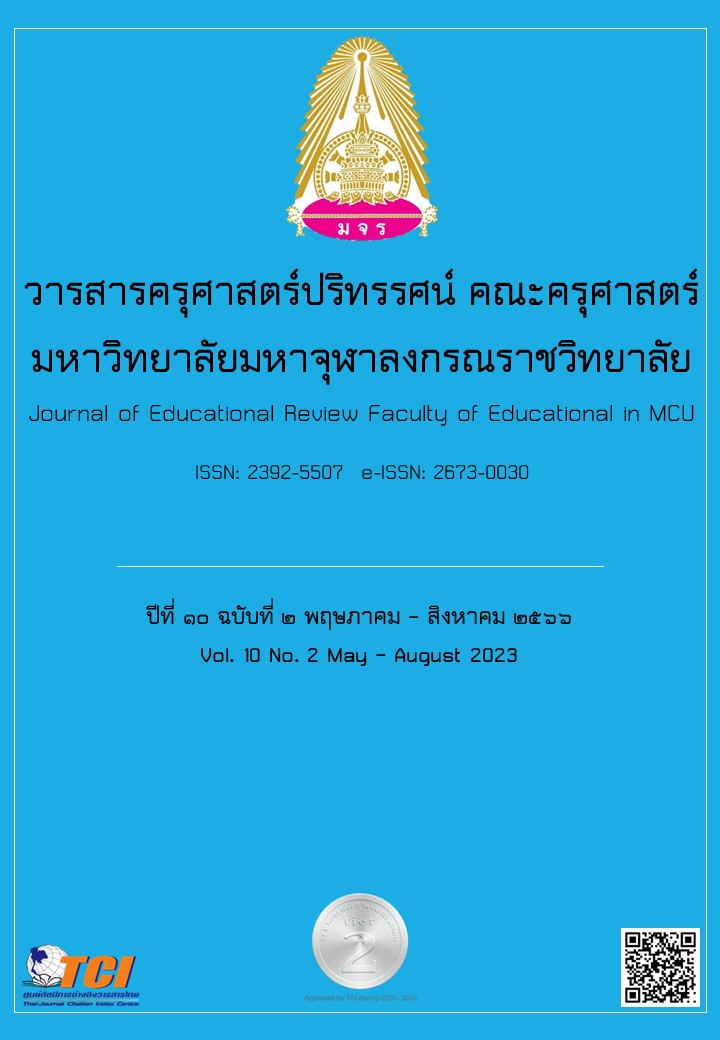A STUDY OF PASSIONATE TEACHER LEVEL OF TEACHERS AT YOTHINBURANA SCHOOL
Main Article Content
Abstract
The objectives of this research were to study the level of passionate teacher of teachers at Yothinburana School by using the passionate teacher conceptual framework. This study was conducted with descriptive method. The population was Yothinburana School. The informants were 1 school director and 4 deputy directors, totaling 5 people by purposive sampling and 160 teachers by random sampling, the number of 113 people, a total of 118 people. The research tool was the level of passionate teacher of teachers at Yothinburana School. The data were analyzed by frequency distribution, percentage, mean and standard deviation. The results were found that: The level of Passionate Teacher of teachers at Yothinburana School overall were in the high level. When considering the level of Passionate Teacher of teachers at Yothinburana School, it was deep subject matter Knowledge and teaching techniques had the highest level, was the second reflect on their goals and beliefs, be hopeful in the teaching profession and education, care about their students and see them an important and use of knowledge and emotion simultaneously have the lowest level, respectively.
Article Details

This work is licensed under a Creative Commons Attribution-NonCommercial-NoDerivatives 4.0 International License.
ทัศนะและความคิดเห็นที่ปรากฏในบทความในวารสารฉบับนี้ถือเป็นความรับผิดชอบของผู้เขียนบทความนั้นเพียงผู้เดียว และไม่ถือเป็นทัศนะและความรับผิดชอบของกองบรรณาธิการ
กองบรรณาธิการขอสงวนสิทธิ์ในการคัดเลือกบทความลงตีพิมพ์และจะแจ้งให้เจ้าของบทความทราบหลังจากผู้ประเมินบทความตรวจอ่านบทความแล้ว
ต้นฉบับที่ได้รับการตีพิมพ์ในวารสารครุศาสตร์ปริทรรศน์ คณะครุศาสตร์ มหาวิทยาลัยมหาจุฬาลงกรณราชวิทยาลัย ถือเป็นกรรมสิทธิ์ของคณะครุศาสตร์ มหาวิทยาลัยมหาจุฬาลงกรณราชวิทยาลัย ห้ามนำข้อความทั้งหมดหรือบางส่วนไปพิมพ์ซ้ำ เว้นเสียแต่ว่าจะได้รับอนุญาตจากมหาวิทยาลัยฯ เป็นลายลักษณ์อักษร
References
ทิศนา แขมมณี. (2557). ปลุกการสอนให้มีชีวิตสู่ห้องเรียนแห่งศตวรรษใหม่. การประชุมวิชาการอภิวัฒน์การเรียนรู้สู่จุดเปลี่ยนประเทศไทย. กรุงเทพมหานคร: สำนักงานส่งเสริมสังคมแห่งการเรียนรู้และคุณภาพเยาวชน.
ธร สุนทรายุทธ. (2551). การบริหารจัดการเชิงปฏิรูป. กรุงเทพมหานคร: โรงพิมพ์เนติกุลการพิมพ์.
ปกรณ์ รัตนทรัพย์ศิริ และธีรพัฒน์ วงศ์คุ้มสิน. (2564). ความมั่นคงทางอารมณ์ ความสามารถในการฟันฝ่าอุปสรรค การเสริมสร้างพลังอำนาจและความสุขในการทำงานของครูโรงเรียนเอกชนสายสามัญ จังหวัดเพชรบุรี. วารสารสุทธิปริทัศน์. 35(3). 155-173.
ภูษิมา ภิญโญสินวัฒน์. (2563). จัดการเรียนการสอนอย่างไรในสถานการณ์โควิด-19: จากบทเรียนต่างประเทศสู่การจัดการเรียนรู้ของไทย. แหล่งที่มา https://tdri.or.th/2020/05/examples-of-teaching-and-learning-in-covid-19-pandemic/ สืบค้นเมื่อ 20 ม.ค. 2566.
มนตรี อินตา และกาญจนา อินตา. (2562). อารมณ์ในชั้นเรียน: อารมณ์ของครูมีผลต่อนักเรียนอย่างไร. วารสารวิจัยราชภัฏพระนคร มนุษยศาสตร์และสังคมศาสตร์. 14(2). 461-481.
โรงเรียนโยธินบูรณะ. (2564). รายงานการประเมินตนเองประจำปีของสถานศึกษา ประจำปีการศึกษา 2564. กรุงเทพมหานคร: โรงเรียนโยธินบูรณะ.
ศิริวรรณ เสรีรัตน์ และคณะ. (2550). การจัดการและพฤติกรรมองค์การ. กรุงเทพมหานคร: โรงพิมพ์ธีรฟิล์มและไซเท็กซ์.
เสาวรี ภูบาลชื่น. (2563). การพัฒนากิจกรรมการเรียนรู้ โดยใช้วิธีสอนแบบทางตรง ร่วมกับการเรียนรู้แบบร่วมมือเทคนิค STAD เพื่อส่งเสริมความสามารถ ด้านทักษะปฏิบัติ ผลสัมฤทธิ์ทางการเรียน และความพึงพอใจ วิชาศิลปะ สำหรับนักเรียนชั้นประถมศึกษาปีที่ 6. วารสารมนุษยศาสตร์และสังคมศาสตร์ มหาวิทยาลัยมหาสารคาม. 39(5). 81-92.
Agustin, F. (2022). Investigating EFL Passionate Teachers in Teaching English Speaking Skills. English Education Study Program Tarbiyah and Tadris Faculty UIN Fatmawati Sukarno Bengkulu. Universitas Islam Negeri.
Day, C. (2004). A Passion for Teaching. London: Routledge Falmer.
Fried, R. (2001). The Passionate Teacher: A Practical Guide. Boston: Beacon Press.
Trigwell, K. (2012). Relations between teachers’ emotions in teaching and their approaches to teaching in higher education. Journal of Instructional Science. 40. 607–621.
Zehm et al. (1993). On Being a Teacher : The Human Dimension. Thousand Oaks, CA: Corwin Press.


